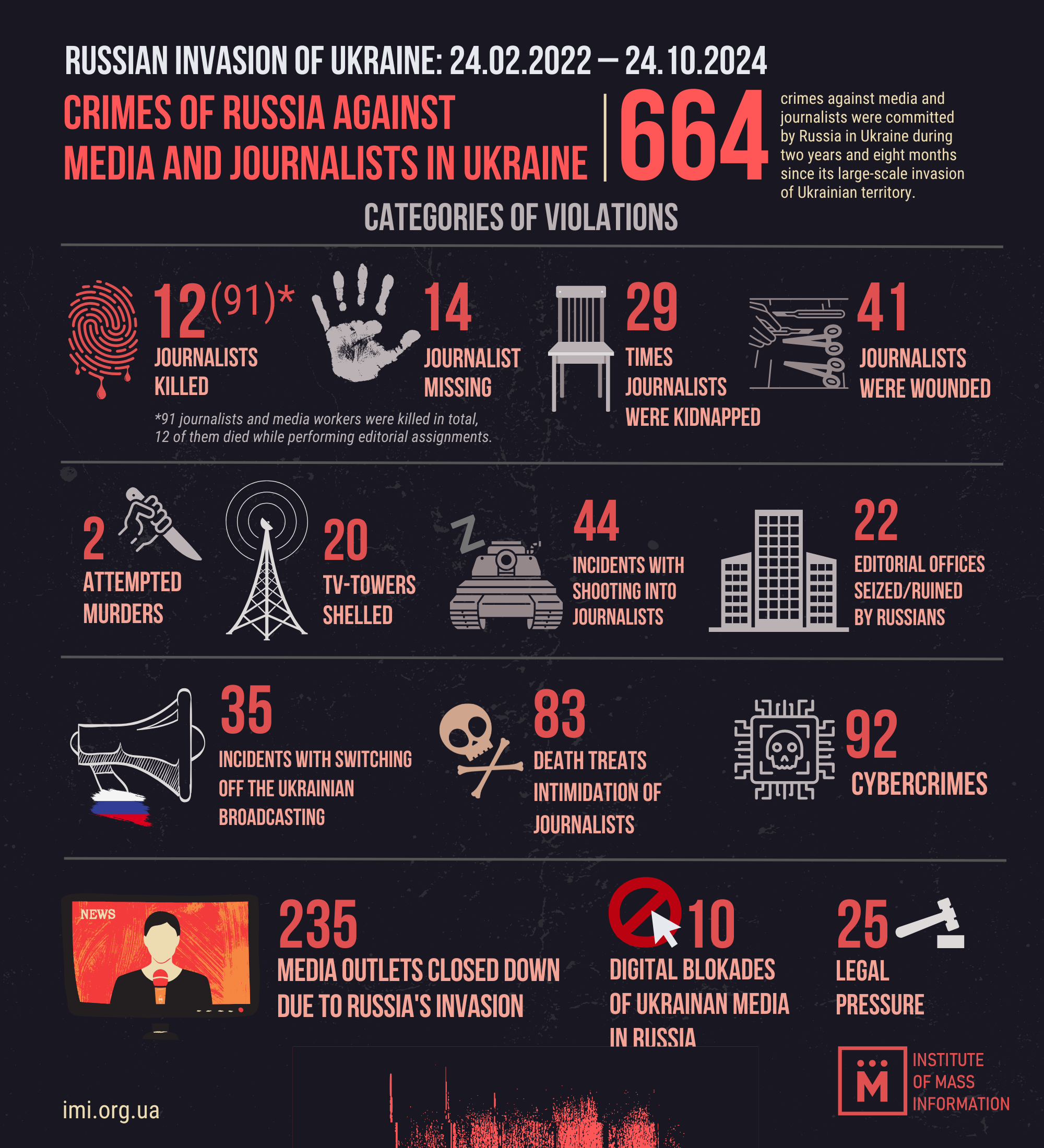In the 2 years and 8 months since the start of the full-scale invasion Russia committed 664 crimes against journalists and the media in Ukraine.
This is evidenced by the monthly monitoring of Russia’s crimes against journalists and the media by the Institute of Mass Information.
In September – October of 2024 the IMI recorded 27 crimes against the media and journalists committed by Russia: murder, threats, opening fire on journalists and shelling media offices, cyber attacks, and legal pressure.
Russia’s aggression resulted in the death of two media professionals in September:
- Stanislav Zhytnytskyi, a soldier and line producer with the STB and Novyi Kanal.
- Victoria Roshchyna, who died in Russian custody. Her death was reported on October 10, 2024. According to the letter sent to her family by Russia’s Ministry of Defense on that day Victoria died on September 19. Her name had been on the swap lists. The police reclassified the case opened previously over Roshchyna’s disappearance as a war crime involving premeditated murder.
According to the IMI, as of October 24, 91 media professionals have died in Ukraine due to Russia’s full-scale aggression, with 12 of them dying while reporting.

Russia’s crimes against the media and journalists in Ukraine
Soldier, journalist, and human rights advocate Maksym Butkevych* returned to Ukraine from Russian captivity as part of a prisoner swap on October 18. He is the second Ukrainian journalist to be released from Russian custody in 2024.
Two media offices were damaged by Russian shelling:
- Suspilne Dnipro: the main entrance door was damaged, windows on the second floor of the main building and in the former radio building were broken. None of the employees were injured. At the time of the shelling strike, one person was in the office – she managed to take cover in a safe place.
- Holos Hulyaipillya: a newspaper whose office in Zaporizhzhia was affected by a Russian aerial bomb (KAB) strike, which also damaged the computer equipment.
“Donbas Realii” (Radio Liberty project) correspondent Roman Pahulych suffered a concussion from coming under Russian fire in the Bakhmut area of Donetsk oblast along with the cameraman Pavlo Kholodov. They were filming the work of FPV operators when the Russian troops targeted the Ukrainian positions with barrel artillery. Roman Pahulych suffered a concussion; the debris did not hit the cameraman Pavel Kholodov.
“Gvara Media” journalist Denys Klymenko came under Russian fire in Kharkiv oblast while working with the “Khartia” brigade near Lyptsi village. No one was injured and everyone survived.
Moreover, Russia’s Federal Security Service (FSB) continued to open cases against journalists who have reported from Sudzha for alleged illegal border crossing:
- Australia’s ABV News correspondents Fletcher Yeung and Kathryn Diss;
- Romanian freelancer Mircea Barbu, who reports for the Romanian media outlet HotNews;
- France 24 journalist Catherine Norris Trent;
- reporter for the Swiss media holding “CN Media” Kurt Pelda.
Russian courts also made judgements in cases against foregin and Ukrainian journalists:
- arresting the journalists for Italy’s RAI (Russia had earlier opened cases against them over Sudzha reports);
- sentencing Ukrainian journalist Yanina Sokolova to eight years in prison, convicting her of inciting international hatred.
On October 14 multiple national and regional media outlets and journalists received identical emails with bomb threats. Such letters arrived to several Suspilne branches, Ukrainian Pravda, Detector Media, LIGA.net, Poltavska Dumka, Kremenchutska Hazeta, Syla Pravdy, etc.
The emails list the Radio Liberty journalists whom the senders blame for the supposed terrorist act. These are Iryna Sysak, Valeria Yehoshyna, and Yulia Khymeryk, who are the authors of the Radio Liberty investigation into the FSB’s recruitment of Ukrainian children to set fire to UAF cars. The senders asked to give all the credit to “the terrorist group Fire Cells Group”. The police checked all the buildings where bombs were said to have been planted and said that the threats were false and came from Russian IP addresses.
*Maksym Butkevych is excluded from the IMI’s statistics, as he is a combatant.
Read the full monitoring here.
The Institute of Mass Information (IMI) is a Ukrainian non-governmental media organization that has been operating since 1996. The IMI defends the rights of journalists, analyzes the media field and covers media-related events, fights propaganda and disinformation and has been providing media outlets with safety gear for trips to the combat zone since the start of the Russo–Ukrainian war in 2014.
The IMI carries out Ukraine’s only freedom of speech monitoring and keeps a list of high quality and sustainable online media outlets, documents Russia’s crimes against the media committed in the course of the war on Ukraine. The IMI has representatives in 20 oblasts of Ukraine and a network of “Mediabaza” hubs to provide journalists with continuous support. The IMI’s partners include Reporters Without Borders and Freedom House; the organization is a member of the International Organization for the Protection of Freedom of Expression (IFEX).
